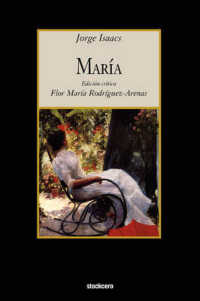Full Description
Volume XXIX of Studies in Contemporary Jewry takes its title from a joke by Groucho Marx: "I don't want to belong to any club that will accept me as a member." The line encapsulates one of the most important characteristics of Jewish humor: the desire to buffer oneself from potentially unsafe or awkward situations, and thus to achieve social and emotional freedom. By studying the history and development of Jewish humor, the essays in this volume not only provide nuanced accounts of how Jewish humor can be described but also make a case for the importance of humor in studying any culture.
A recent survey showed that about four in ten American Jews felt that "having a good sense of humor" was "an essential part of what being Jewish means to them," on a par with or exceeding caring for Israel, observing Jewish law, and eating traditional foods. As these essays show, Jewish humor has served many functions as a form of "insider" speech. It has been used to ridicule; to unite people in the face of their enemies; to challenge authority; to deride politics and politicians; in America, to ridicule conspicuous consumption; in Israel, to contrast expectations of political normalcy and bitter reality. However, much of contemporary Jewish humor is designed not only or even primarily as insider speech. Rather, it rewards all those who get the punch line.
A Club of Their Own moves beyond general theorizing about the nature of Jewish humor by serving a smorgasbord of finely grained, historically situated, and contextualized interdisciplinary studies of humor and its consumption in Jewish life in the modern world.
Contents
Symposium
A Club of Their Own: Jewish Humorists and the Contemporary World
Steven Beller, "The Right Mélange": Viennese Operetta as a Stage for Jewish Humor
Edward Portnoy, Purim on Pesach: The Invented Tradition of Passover Yontef-bletlekh in the Warsaw Yiddish Press
Stephen J. Whitfield, Jackie Mason: The Comedian as Ethnographer
Jarrod Tanny, Decoding Seinfeld's Jewishness
Michael Berkowitz, "Humour Wholesalers"? Laurence Marks and Maurice Gran's Anglo-Jewish Television Comedy
Carol Zemel, Funny-Looking: Thoughts on Jewish Visual Humor
Anna Shternshis, Humor and Russian Jewish Identity
Avinoam Patt, "Laughter through Tears": Jewish Humor in the Aftermath of the Holocaust
Kerstin Steitz, And Hannah Laughed: The Role of Irony in Hannah Arendt's Eichmann in Jerusalem
Gabriel N. Finder, An Irony of History: Ephraim Kishon's German Triumph
Diego Rotman, The "Tsadik from Plonsk" and "Goldenyu": Political Satire in Dzigan and Shumacher's Israeli Comic Repertoire
Limor Shifman, Humor and Ethnicity on Israeli Television: A Historical Perspective
Asal Dardan, From Monsters to Pop Icons: The Use of Humor in Films on Nazis and Hitler since Der Untergang
David Slucki, Making Out in Anne Frank's Attic: Humor and the Holocaust in Australia
Essay
Richard I. Cohen, In Memoriam: Ezra Mendelsohn
Review Essay
Olga Litvak, The New Marranos
Book Reviews
(arranged by subject)
Antisemitism, Holocaust, and Genocide
Esther Farbstein, Beseter hamadregah: hayahadut haortodoksit behungariyah nokha? hashoah
(Hidden in the Heights: Orthodox Jewry in Hungary during the Holocaust), Haim Genizi
Amos Goldberg, Traumah beguf rishon: ketivat yomanim bitkufat hashoah (Trauma in First
Person: Diary Writing during the Holocaust), Omri Herzog
Michal Shaul, Pe'er tahat 'efer: hahevrah haharedit beyisrael betzel hashoah 1945-1961
(Beauty for Ashes: Holocaust Memory and the Rehabilitation of Ashkenazi Haredi
Society in Israel 1945-1961), Judith Tydor Baumel-Schwartz
Ben Urwand, The Collaboration: Hollywood's Pact with Hitler, Ofer Ashkenazi
Cultural Studies
Joy Calico, Arnold Schoenberg's A Survivor from Warsaw in Postwar Europe, Yoel Greenberg
Olga Gershenson, The Phantom Holocaust: Soviet Cinema and Jewish Catastrophe, Olga Litvak
Ernest B. Gilman, Yiddish Poetry and the Tuberculosis Sanatorium 1900-1970, Jan Schwarz
Rina Lapidus, Jewish Women Writers in the Soviet Union, Olga Litvak
Harriet Murav, Music from a Speeding Train: Jewish Literature in Post-Revolutionary Russia, Olga Litvak
Efraim Sicher (ed.), Race, Color, Identity: Rethinking Discourses about "Jews" in the Twenty- First Century, Mitchell B. Hart
Yosef Tobi and Tsivia Tobi, Judeo-Arabic Literature in Tunisia, 1850-1950, Norman (Noam) A. Stillman
History and Biography
Mordechai Altshuler, Religion and Jewish Identity in the Soviet Union, 1941-1964, trans. Saadya Sternberg, Olga Litvak
Dianne Ashton, Hanukkah in America: A History, Hizky Shoham
Elissa Bemporad, Becoming Soviet Jews: The Bolshevik Experiment in Minsk, Olga Litvak
Ava F. Kahn and Adam D. Mendelsohn, Transnational Traditions: New Perspectives on American Jewish History, Eli Lederhendler
Cecile Esther Kuznitz, YIVO and the Making of Modern Jewish Culture: Scholarship for the Yiddish Nation, Eli Lederhendler
Jess Olson, Nathan Birnbaum and Jewish Modernity: Architect of Zionism, Yiddishism and Orthodoxy, David Weinberg
Yaacov Ro'i (ed.), The Jewish Movement in the Soviet Union, Olga Litvak
David Shneer, Through Soviet Jewish Eyes: Photography, War and the Holocaust, Olga Litvak
Lee-Shai Weissbach (ed. and trans.), A Jewish Life on Three Continents: The Memoir of Menachem Mendel Frieden, Gur Alroey
Zionism, Israel, and the Middle East
Gideon Aran, Kookism: shoreshei Gush Emunim, tarbut hamitna?alim, teologiyah tziyonit, meshihiyut bizmanenu (Kookism: The Roots of Gush Emunim, Settler Culture, Zionist
Theology, and Contemporary Messianism), Tamar Ross
Israel Bartal and Shimon Shamir, Beit Salomon: sheloshah dorot shel mehadeshei hayishuv (The Salomons: Three Generations of Pioneers and Leaders), Reuven Gafni
Anat Helman, A Coat of Many Colors: Dress Culture in the Young State of Israel, Jenna Weissman Joselit
Mark LeVine and Mathias Mossberg (eds.), One Land, Two States: Israel and Palestine as Parallel States, Menachem Klein
Studies in Contemporary Jewry XXX
Note on Editorial Policy








